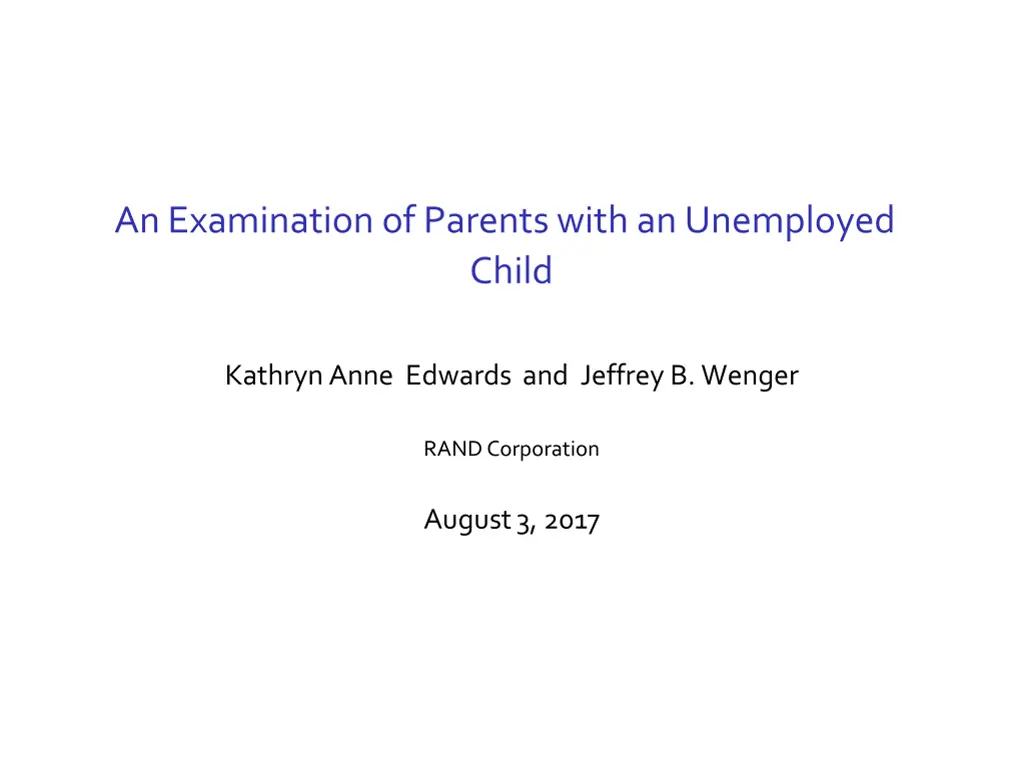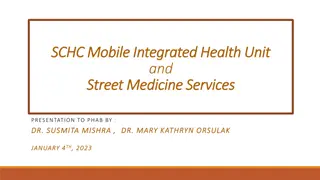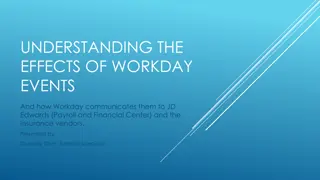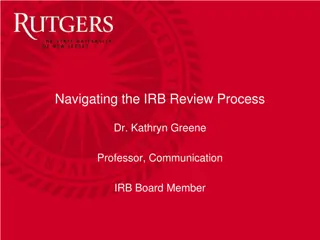
Understanding Impact of Child Unemployment on Parents: A Study Analysis
Explore the intricate dynamics of parental behavior when facing a child's unemployment. Discover the adjustments in income, consumption, and savings patterns as parents navigate this challenging situation. Gain insights from prior research and delve into the financial support mechanisms within families.
Download Presentation

Please find below an Image/Link to download the presentation.
The content on the website is provided AS IS for your information and personal use only. It may not be sold, licensed, or shared on other websites without obtaining consent from the author. If you encounter any issues during the download, it is possible that the publisher has removed the file from their server.
You are allowed to download the files provided on this website for personal or commercial use, subject to the condition that they are used lawfully. All files are the property of their respective owners.
The content on the website is provided AS IS for your information and personal use only. It may not be sold, licensed, or shared on other websites without obtaining consent from the author.
E N D
Presentation Transcript
An Examination of Parents with an Unemployed Child Kathryn Anne Edwards and Jeffrey B. Wenger RAND Corporation August 3, 2017
Figure 1: Age of Unemployed Heads/Spouses of Households, PSID, 1985-2013
Figure 2: Age of Mothers of Unemployed Heads/Spouses, PSID, 1985-2013
Prior Research Families provide financial support to their unemployed members Intra-family, inter-household cash assistance 1970-2012 Panel Study of Income Dynamics: Receipt from any family member (Edwards, 2016) 2008-2010 American Life Panel Giving and receiving among family members (80% parents) (Cox and Way, 2011) 1992-2008 Health and Retirement Study Giving from parents to children (McGarry 2016)
Question To what extent do parents adjust their behavior when their child is unemployed?
Question To what extent do parents adjust their behavior when their child is unemployed? Budget Constraint: 0 = IncomeE - ConsumptionE -SavingsE
Question To what extent do parents adjust their behavior when their child is unemployed? Budget Constraint: 0 = IncomeE - ConsumptionE -SavingsE 0 = IncomeU - ConsumptionU -SavingsU - TransferU
Question To what extent do parents adjust their behavior when their child is unemployed? Budget Constraint: 0 = IncomeE - ConsumptionE -SavingsE 0 = IncomeU - ConsumptionU - SavingsU -TransferU TransferU = Income - Consumption - Savings
Question To what extent do parents adjust their behavior when their child is unemployed? Budget Constraint: 0 = IncomeE - ConsumptionE -SavingsE 0 = IncomeU - ConsumptionU - SavingsU -TransferU TransferU = Income - Consumption - Savings Goal: (empirically) identify Income, Consumption, Savings due to child s unemployment
This paper Concurrently observed mothers and adult children in the Panel Study of Income Dynamics Three age groups of mothers: < 62 years old 62-70 years old 70+ years old Child unemployment spells that are not associated with school exit or (loss of head) co-residence
Model Regress parent outcomes (Ypt) on a child s unemployment spell (UKidpt ), controlling for changing parent observables (Xpt ) and unchanging parentalcharacteristics( p): Ypt = Xptt + UKidpt + p + pt Causally identified to the extent that a child s unemployment is random, given parent fixed effects.
Results Transfers (HH) Annual total of reported cash sent to a child Increase in transfers Sample Average: $270, Coefficient: $64 Significant for all age groups
Results Income 1. (Ind) Labor Supply -Hours per Week 2. (Ind) Labor Supply -Weeks per Year 3. (HH) Social Security Receipt Increase in annual weeks worked Mothers < 62 years old Larger if conditioned on prior labor force attachment Conditional Sample Average: 32.0 weeks, Coefficient: .681 Increase in Social Security receipt Mothers 65-70 years old and partnered Some evidence larger effect for mothers at or above full retirement age Conditional Sample Average: 87.3, Coefficient: .027
Results Consumption (HH) Annual food expenditures Decrease in food consumption Sample Average: $10955, Coefficient: -$224 Significant for all age groups; larger drop for older mothers
Results Savings (1999-2013) 1. (Ind) Percent of income contributed to pension 2. (Ind) Any contribution to pension 3. (HH) Asset values (farm/business income, cash, real estate, other assets, stock, vehicles,) Decrease in percent of income contributed to pension Mothers <62 years old Conditional Sample Average: .713, Coefficient: -.145 Increase in any (new) contribution Mothers 62-70 years old Conditional Sample Average: 3.4%, Coefficient: .019 Decrease in vehicle value Varies with the adult child s situation and relative education Conditional Sample Average: $20500, Coefficient: -$1246
Research Considerations The observed change in income, consumption, and savings in the year of the unemployment spell was larger than observed cash transfer. 1. Cash transfers are a small share of total assistance 2. Parents behavioral adjustments occur not only to finance any assistance, but as a result of changes in expectation or perceived risk.
Policy Considerations 1.This and other research points to evidence of parental provision of a safety net Potentially increasing over time 2.Concurrent with dramatic changes to the safety net geared towards working-age population Erosion of UI take-up Welfare reform Expansion of Medicaid and Food Stamps (SNAP)






















